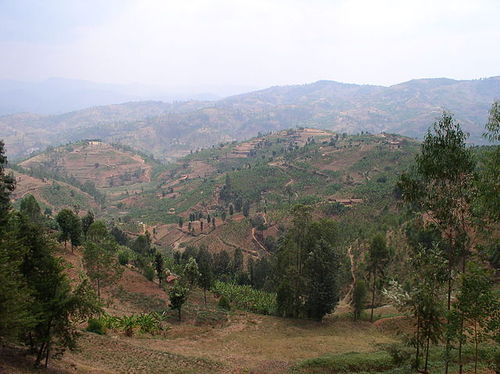
Initiatives by topic
Biodiversity
The national parks and forest reserves are under threat due to poaching, invasive plants such as water hyacinth, unauthorized livestock grazing, illegal fishing, bush fires, mining, bamboo harvesting, encroachment of protected land for agricultural farming, firewood gathering, be keeping and herbal plant extraction. The resins for such a situation is attributed to governance issues lacking in legal acts and guidelines and also heavy anthropogenic pressure.
Conservation management plans have been instituted for all protected areas which involves the community of villages living in and around the protected areas. Conservation activities have focused on increasing the forest density by planting trees in a "natural self rehabilitation and natural regeneration of primary and high value species". The planting has involved species such as carissa macrocarpa, entandrophragma (a genus of eleven species of deciduous trees) and symphonia globulifera, and erecting protective fencing on the boundary of the forest reserves using leguminous thorny plants.
One of the concerted efforts initiated by the Government of Rwanda is to increase the number of protected areas and to proliferate tree plantations to increase the present forest area cover of 10% to 20% by 2020. W
Community energy
The use of off-grid solar power has increased as solar panel prices have fallen and many areas do not expect grid connections in the near future. The first utility-scale solar farm in Sub-Saharan Africa outside of South Africa is the 8.5MW plant at Agahozo-Shalom Youth Village, in the Rwamagana District, Eastern Province of Rwanda. It leased 20 hectares (49 acres) of land from the village which is a charity to house and educate Rwandan genocide victims. The plant uses 28,360 photovoltaic panels and produces 6% of total electrical supply of the country. The project was built with U.S., Israeli, Dutch, Norwegian, Finnish and UK funding and expertise. W
News and comment
2015
Road safety initiative helps Rwanda's motorbike taxis stay on the right track, Clar Ni Chonghaile, December 28 [1]
How Africa's fastest solar power project is lighting up Rwanda, November 23 [2]
How Rwanda’s clinics have gone off-grid and onto renewable energy, June 25 [3]
2010
2010 SEED Award Winners, [4] November 3
"Production and Distribution of Pressurized Biogas in Gas Cylinders". This initiative has been developed by a private company, an international NGO and government organizations to produce and store pressurised biogas for cooking made from urban, domestic and industrial wastes. Environmental benefits are achieved by offering an alternative firing material to firewood and charcoal.
"Efficient Charcoal Production and Smoke Recycling". This partnership of international NGOs, government institutions and a reforestation initiative is promoting new technologies to increase the energy output of charcoal. As a result, this significantly reduces the amount of forestland used for the production of charcoal and lessens air pollution by recycling tar and other smoke components.
Rwanda named global host of World Environment Day 2010, [5] February 17
Resources
Apps for sustainability
Interwiki links
Wikipedia: Rwanda
References Template:Attrib sca ref